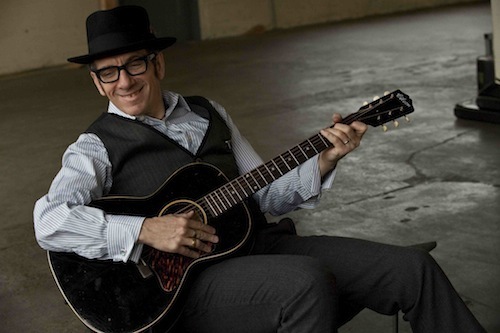
02.28.2016
INDELIBLE ‘INK’
Columbia Daily Tribune: Aarik Danielsen: February 2016
I have great respect for artists who can execute their vision across multiple mediums or disciplines. I can barely do one thing — string sentences together in modest, inoffensive patterns.
Among my most exciting gifts this Christmas was a copy of Elvis Costello’s autobiography, “Unfaithful Music and Disappearing Ink,” which hit bookstores in October.
First a New Wave agitator, eventually a statesman of song, the man born Declan MacManus has, for me, existed in the category of long-admired but little-studied artists.
So, to have Costello’s life in my hands, complete with a beckoning, black-and-white cover photo of the wily artist in weary repose, brought serious joy.
Almost two months with Costello’s book has only compounded that joy. “Unfaithful Music” proves that the man is a born writer, with or without guitar in hand. Costello’s abilities as a storyteller and shaper of sentences makes me wish he had written earlier and more often.
The only memoir that compares, formally and tonally, is Bob Dylan’s 2004 effort “Chronicles, Volume One.”
Both books avoid what is, by now, a rote structure, taking the reader on a chronological journey from humble child to reluctant hero to out-of-control star to wise elder.
All these aspects belong in Costello’s story but, like Dylan, he takes a nonlinear, zig then zag, approach that grounds readers in more impressionistic details and asks them to learn their own lessons.
Unlike Dylan, you actually believe everything Costello says. While both artists leave a bit of mythology intact, Costello also deconstructs that mythology at will.
He soulfully examines a conflicted, yet ultimately close, relationship with his father. The elder MacManus was a charming big-band singer whose history with women presaged Costello’s own romantic excursions before he settled down with third wife and jazz luminary Diana Krall more than 12 years ago.
Costello unpacks his emotional baggage often and documents living out of a suitcase in dizzying detail. He is frank about his faults; about the moments in which he pushed back against lovers and labels out of youthful ignorance, youthful arrogance or a bit of both.
The man who wrote “Deep Dark Truthful Mirror” for the 1989 album “Spike” seems unafraid to look into his, and the reader is better for Costello’s decision not to fluff up his legend too much.
Students of Costello’s songs — or of popular music in the past 40 years — will appreciate the volume of material about music-making. I was at times tempted to write Costello’s words off as name-dropping, as many chapters open with or focus on his many collaborations.
But it would be impossible for Costello to tell his story without telling the stories of how he came to work with and befriend Dylan, Burt Bacharach, Paul McCartney, Allen Toussaint and The Roots, to name a few. He clearly relished these opportunities, writing as if he simply were a music lover pinching himself at his own dumb luck.
“I know I never expected to meet half the people who I’ve encountered down these years and across these pages,” he wrote. “I thought they were just names on record jackets, reputations spelled out in the lightbulbs of a marquee, or consoling voices in the dark, but that’s not that way it has turned out.”
Perhaps the greatest compliment I can pay Costello is that in almost 700 pages, he never lost me once. I felt a twinge of sadness as he had the last word, wishing to know more about a life often well-lived, occasionally squandered. In that sense, I suppose rock stars do put their pants on one leg at a time like the rest of us.
“Unfaithful Music” is as much about manhood, growing into your own skin and sense of self, as it is about writing enduring songs. One of the most moving passages comes late in the book as Costello details his father’s final chapter. He relates how a break from recording, ostensibly to focus on performing, was really a recognition of what little time his father had left.
“The real reason was that I needed time to imagine how I could bear to write songs and not be able to play them for my father,” he wrote. “Watching him listen to music was irreplaceable to me. There are some things that music just can’t fix.”
A number of multitalented artists make their presence felt in Columbia. Off the top of my head, I can name musician-photographers Joel Anderson and Dave Dearnley, musician-poet Anand Prahlad, artist and author Gladys Swan, filmmaker and writer Robert Greene and my former colleague and dear friend Amy Wilder, who can write, paint, draw and conceive all manner of art installation.
These artists are not more valuable or special than those who do one thing well. But, there is something about encountering a person who can express him or herself in multiple ways. We see and know more of that person as we are allowed access to their various sides.
Elvis Costello does that for those who will read “Unfaithful Music,” proving it isn’t every day a rock ’n’ roll singer writes a book like that.